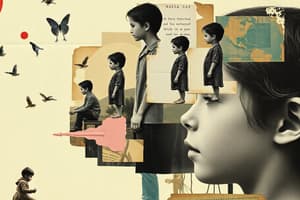Podcast
Questions and Answers
During which developmental stage do individuals typically experience adjustments to new life patterns and roles such as becoming a spouse or parent?
During which developmental stage do individuals typically experience adjustments to new life patterns and roles such as becoming a spouse or parent?
- Early Adulthood (correct)
- Late Childhood
- Adolescence
- Middle Age
The prenatal stage is characterized by adjustments to initial physical and mental decline.
The prenatal stage is characterized by adjustments to initial physical and mental decline.
False (B)
According to Robert Havighurst's Developmental Tasks Theory, how does an individual progress from one developmental stage to the next?
According to Robert Havighurst's Developmental Tasks Theory, how does an individual progress from one developmental stage to the next?
Successful resolution of problems or performance of developmental tasks
The age of transition from childhood to adulthood, characterized by sex maturation and rapid physical development, is known as ______.
The age of transition from childhood to adulthood, characterized by sex maturation and rapid physical development, is known as ______.
Match the developmental stage with its primary characteristic:
Match the developmental stage with its primary characteristic:
Which developmental stage is described as the 'pre-gang age,' during which language and elementary reasoning are acquired?
Which developmental stage is described as the 'pre-gang age,' during which language and elementary reasoning are acquired?
Studying human growth and changes across the lifespan is not essential for understanding how humans learn and mature.
Studying human growth and changes across the lifespan is not essential for understanding how humans learn and mature.
What key event marks the beginning of the prenatal stage?
What key event marks the beginning of the prenatal stage?
A human being is always undergoing ______.
A human being is always undergoing ______.
Match the developmental stage with the primary focus of development attributed to this stage:
Match the developmental stage with the primary focus of development attributed to this stage:
During which stage are hereditary endowments and sex determined, and body features are developed?
During which stage are hereditary endowments and sex determined, and body features are developed?
Late childhood is characterized by adjustments to new life patterns, such as becoming a spouse.
Late childhood is characterized by adjustments to new life patterns, such as becoming a spouse.
What is the approximate age range for early adulthood, according to the provided text?
What is the approximate age range for early adulthood, according to the provided text?
Robert Havighurst's theory emphasizes that development occurs continuously throughout the ______.
Robert Havighurst's theory emphasizes that development occurs continuously throughout the ______.
Match the developmental theorist with the correct description of their theory:
Match the developmental theorist with the correct description of their theory:
What is a key characteristic of old age?
What is a key characteristic of old age?
Middle age is a period when adjustments to initial physical and mental development are experienced.
Middle age is a period when adjustments to initial physical and mental development are experienced.
What characterizes the transition from childhood to adulthood?
What characterizes the transition from childhood to adulthood?
Late childhood, from ages 6 to 10, is often referred to as the ______ and creativity age.
Late childhood, from ages 6 to 10, is often referred to as the ______ and creativity age.
During which developmental stage do individuals refine their self-help and social skills through play?
During which developmental stage do individuals refine their self-help and social skills through play?
Flashcards
Developmental psychology
Developmental psychology
The study of human growth and changes across the lifespan, including physical, social, intellectual, and emotional aspects.
Prenatal Stage
Prenatal Stage
The period from conception to birth, characterized by rapid development and differentiation of body structures.
Infancy
Infancy
The period from birth to 2 years, marked by the development of basic behaviors and motor skills.
Early Childhood
Early Childhood
Signup and view all the flashcards
Late Childhood
Late Childhood
Signup and view all the flashcards
Adolescence
Adolescence
Signup and view all the flashcards
Early Adulthood
Early Adulthood
Signup and view all the flashcards
Middle Age
Middle Age
Signup and view all the flashcards
Old Age
Old Age
Signup and view all the flashcards
Developmental Tasks Theory
Developmental Tasks Theory
Signup and view all the flashcards
Robert J. Havighurst
Robert J. Havighurst
Signup and view all the flashcards
Study Notes
- Human growth and changes throughout life encompass physical, social, intellectual, perceptual, personality, and emotional development.
- Studying these stages is essential for understanding how humans learn, mature, and adapt.
- Humans are always changing by either growing or declining.
Developmental Stages
- Prenatal Stage (Conception to Birth): Hereditary traits and sex are determined; body features develop.
- Infancy (Birth to 2 years): Basic behaviors are organized; many maturation skills develop.
- Early Childhood (2 to 6 years): Children explore, question, acquire language, reasoning, and experience initial socialization.
- Late Childhood (6 to 10 years): Self-help, social skills, and play develop alongside creativity.
- Adolescence (Puberty to 18 years): Transition from childhood to adulthood, marked by sexual maturation and rapid physical changes affecting feelings, thoughts, and actions.
- Early Adulthood (18 to 40 years): Adjustments to new life patterns and roles (spouse, parent, worker) occur.
- Middle Age (40 years to retirement): Adjustments to physical and mental decline are experienced.
- Old Age (Retirement to death): Rapid physical and mental decline occurs.
Developmental Tasks Theory
- Robert J. Havighurst proposed that development is continuous, occurring in stages.
- Individuals move from one stage to the next by successfully resolving problems or performing developmental tasks.
Studying That Suits You
Use AI to generate personalized quizzes and flashcards to suit your learning preferences.





